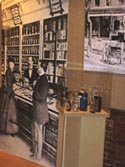| Join | Official Historian | City of Stamford | Blog | About Us | |
| Jewish Historical Society | Civil War Roundtable | Contact Us | |
|
|
|
|
The Stamford Historical Society PresentsImmigrants' StamfordIntroduction
The first wave of migration was from Ireland. Later waves of immigrants came from Poland, Italy, Hungary, Czechoslovakia, Sweden, and Germany, and each group carried with them a desire to make a better life for themselves in Stamford. Each group also brought different traditions and faiths from its country of origin. The exhibit documents the similar process by which each group established itself in Stamford. Invariably, the first act taken by recent immigrants was to found a society, usually with a religious background. Once the immigrant group's population grew to a sufficient size a church was established. The Irish successfully founded Stamford's first Roman Catholic Church when St. John's was constructed, initially on Meadow Street. The church became the center of social identity and community for each new immigrant group. Each church also served as a center of social activities and mutual aid societies as well as a locus for the preservation of Old World traditions. The large gallery presents photos, images and items documenting the establishment of each community. The smaller side gallery is designed to illustrate the living conditions faced by many of the large immigrant families. The gallery is set up as a tenement. The kitchen area includes an old stove, kitchen implements, and an ice-box. The back room is set up as a bedroom. The tenement represents the typical 1920s apartment lived in by many of the more recent immigrants. Personal recollections and stories by the Society's own Frank Zurzola have been used as source material for the reconstruction of tenement lifeways. The front hall is a reconstruction of Pacific Street, which at one point stood at the core of Stamford's immigrant community. Pacific Street was a microcosm of the larger downtown community for here immigrants from all nations converged to do their shopping and business. The residential community about Pacific Street was likewise a mixture of people from all over Europe. Photos as well as articles of many of the stores on Pacific Street are displayed. The Halliday Gallery completes the picture of immigrants' experience. While the large red gallery focuses on community and neighborhoods, and the smaller gallery portrays the hearth of immigrant families, the Halliday Gallery shows the immigrants at work. Stamford has a number of nascent industries when the first Irish laborers arrived in the 1840s. Immigrant labor drove the expansion of industry in Stamford and provided opportunities for entrepreneurs and industrialists to move their businesses to Stamford. By the end of the 19th century, Stamford was a burgeoning center of industry best represented by the Stamford Manufacturing Company, Getman and Judd Lumber, and the great lockworks at Yale and Towne. It was the manufacture of locks at Y&T that gave Stamford its earlier name: the Lock City. The exhibit has been long in preparation and has gone through a number of transformations and additions. SHS would like to thank all those who donated pictures and materials to help us tell the immigrants' story. Special thanks to the Jewish Historical Society for pictures and materials, and to Walter Wheeler and Eva Weller who provided the impetus for the exhibit with the Cultural Mosaic and whose many hours on the project have made it a success. Tom Zoubek Bibliography We are interested in immigration or migration stories. Details. |
|
|
|
 The focus of the exhibit is on the development of
Stamford as a diverse community composed of representatives from many different
ethnic backgrounds. The exhibit begins by setting the context for later waves
of immigration by documenting the area's first settlement by individuals primarily
of English descent. Chronologically, the majority of the material presented
covers the years from the arrival of the railroad (1848) through the 1930s.
The focus of the exhibit is on the development of
Stamford as a diverse community composed of representatives from many different
ethnic backgrounds. The exhibit begins by setting the context for later waves
of immigration by documenting the area's first settlement by individuals primarily
of English descent. Chronologically, the majority of the material presented
covers the years from the arrival of the railroad (1848) through the 1930s.